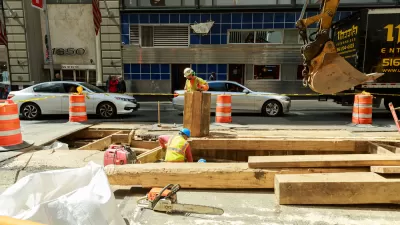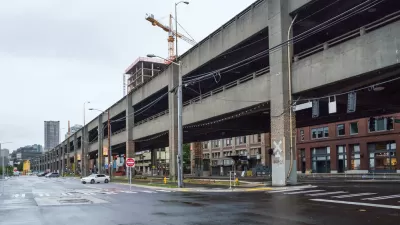San Francisco's Transbay Transit Center is just the latest example of an urban mega-project experiencing an enormous cost overrun. Eric Jaffe examines what the causes of this all too common phenomenon might be.
"So how did it get to the point where the only thing we can confidently expect from a big infrastructure project is that it will cost way more than expected?"
"One thing's for sure: the people who predict the cost of urban mega-projects do a terrible job," writes Jaffe. "Several years ago the University of Oxford scholar Bent Flyvbjerg, who's made a career researching mega-project mismanagement, analyzed 258 transportation infrastructure projects from around the world and found that nine in ten exceeded their cost estimates. The overruns were greater on rail projects than road projects but averaged 28 percent across the board."
"Whatever the underlying causes of cost overruns may be, there seems to be one promising means of addressing them: creating a 'reference class' of similar projects to serve as a platform for comparing costs. The idea, as explained by [psychologist Daniel] Kahneman in 2003 [PDF], is that old outcomes can serve as a barometer for recognizing just how unrealistic a biased new prediction might be — and help adjust it accordingly. Such a strategy controls for both political chicanery and cognitive biases alike."
FULL STORY: Why Mega-Projects End Up Costing Way More Than Expected

Planetizen Federal Action Tracker
A weekly monitor of how Trump’s orders and actions are impacting planners and planning in America.

Restaurant Patios Were a Pandemic Win — Why Were They so Hard to Keep?
Social distancing requirements and changes in travel patterns prompted cities to pilot new uses for street and sidewalk space. Then it got complicated.

Maui's Vacation Rental Debate Turns Ugly
Verbal attacks, misinformation campaigns and fistfights plague a high-stakes debate to convert thousands of vacation rentals into long-term housing.

In California Battle of Housing vs. Environment, Housing Just Won
A new state law significantly limits the power of CEQA, an environmental review law that served as a powerful tool for blocking new development.

Boulder Eliminates Parking Minimums Citywide
Officials estimate the cost of building a single underground parking space at up to $100,000.

Orange County, Florida Adopts Largest US “Sprawl Repair” Code
The ‘Orange Code’ seeks to rectify decades of sprawl-inducing, car-oriented development.
Urban Design for Planners 1: Software Tools
This six-course series explores essential urban design concepts using open source software and equips planners with the tools they need to participate fully in the urban design process.
Planning for Universal Design
Learn the tools for implementing Universal Design in planning regulations.
Heyer Gruel & Associates PA
JM Goldson LLC
Custer County Colorado
City of Camden Redevelopment Agency
City of Astoria
Transportation Research & Education Center (TREC) at Portland State University
Jefferson Parish Government
Camden Redevelopment Agency
City of Claremont





























